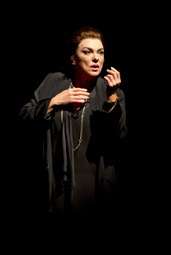|
Back
Daly as La Divina New York
Manhattan Theater Club: Samuel J. Friedman Theater
07/07/2011 - & July 8, 9, 10* and daily (except Mondays) through September 4, 2011
Terrence McNally: Master Class
Tyne Daly (Maria Callas), Sierra Boggess (Sharon Graham), Alexandra Silber (Sophie De Palma), Garrett Sorenson (Anthony Candolino), Clinton Brandhagen (Stagehand), Jeremy Cohen (Emmanuel Weinstock)
Stephen Wadsworth (Director), Thomas Lynch (Scenic Design), Martin Pakledinaz (Costume Design), David Lander (Lighting Design), Jon Gottlieb (Sound Design), Paul Huntley (Wig Design), Susie Cordon (Production Stage Manager)

T. Daly (© Joan Marcus)
Terrence McNally based this fictional account of one of Maria Callas’s master classes at the Julliard School on the real thing. In October and November, 1971 and February and March, 1972, she gave a series of master classes to twenty-five vocal students who had been selected from an applicant pool of three hundred. She had left the operatic stage years before but her talent had been so highly valued that the class was not only attended by students but also by luminaries of opera (Placido Domingo, Tito Gobbi, and Elisabeth Schwarzkopf), actors (Lilian Gish, Ben Gazzara), directors (including Franco Zeffirelli), and even instrumentalists (such as Alexis Weissenberg). Callas coached the students in a wide range of repertoire on matters of style, technique and, of course, her specialty – creating dramatically believable characters through vocal means and also careful character analysis. This then is the reality behind the play.
The play itself is rather a paradox. On one hand, I think that those less familiar with Callas and with the world of opera and its glories probably enjoyed it more, as they were not bothered by the somewhat simplistic delineation of Callas and by the caricatured, almost cartoonish students. Two of the three were so unprepared, they could not even read the directions in the score or understand the Italian words. On the other hand, a familiarity with the opera world did make the sarcastic asides understandable – for example the barbs thrown at Joan Sutherland (Who needs a six foot tall Lucia?) And there was her surprise at the beauty of “Recondita Armonia.” (She had never heard it before, Callas told the young tenor, having always used that time to go into her dressing room to freshen up.) McNally and director Stephen Wadsworth gave us not so much a play but an extended character sketch – a fascinating albeit fictional glimpse into the inner world and egomaniacal behavior of a great diva who has, sadly, outlived her vocal abilities. The three singers were largely props -- vehicles for her barbed wit and bits of wisdom, and triggers for her memories of glory tinged with regret.
Maria Callas in life and long after her death remains a legend -- famous for her spectacular ability to give vocal utterance to a character’s inner life, and also famous for being famous. She was a celebrated artist but also a celebrity. In contrast to singers who husbanded their resources and displayed prudence in their personal and professional lives, Callas blazed across the operatic universe rather like a comet. Within ten years, the glow diminished. She retired from the stage in 1965, having been for some years a spent vocal force.
Her shortened career was almost certainly caused by unwise choices, both musical and also dietary. Teased and ridiculed as an overweight child, she modeled herself on the impossibly slender Audrey Hepburn. Her choices in musical repertoire still seem bizarre. On the threshold of international stardom, in 1948, she sang Turandot, Isolde, Leonora, Aida and Norma-- the last of these in Florence, in December of that year. She left for Venice where, in January, she sang four performances of Brûnnhilde and, three days later, her first of three performances that month of Bellini’s Elvira. Five days after her last Elvira, she sang Brûnnhilde again, in Palermo. This was followed by four Turandots in Naples and Kundry in Rome. Perhaps both professionally and personally she aimed too high, driven to win over her childhood tormentors as well as over other singers whom she came to perceive as enemies, not just rivals.
Tyne Daly certainly does not look like Maria Callas. Nevertheless she commanded the stage with her portrayal of Callas as a tough, imperious, wise-cracking woman living in and on her memories. There was poignancy here but there could have been more. Callas’s vulnerability and insecurities were not plumbed as I think they should have been. Still it was an extraordinary even a mesmerizing performance. Garrett Sorenson, as the tenor, had the best voice of the three students -- an operatically trained voice. His acting was rudimentary but, then again, he was just a caricature, as were the other two singers. Sierra Boggess as Sharon Graham had the difficult task of singing Lady Macbeth’s “Letter aria” without the benefit of a classically trained voice. With different casting, the dynamics between this character and Callas would have been completely different and much more apt; the implicit rivalry between the established albeit faded star and the younger ambitious diva in waiting would have made sense. Alexandra Silber, as the hapless and unprepared Sophie, had the great disadvantage of playing an absurdly drawn character. It was far too easy for her to become the butt of Callas’s cruel taunts. As she did.
Daly was given two long monologues. In the second, she played two characters, Callas and her erstwhile lover, Aristotle Onassis. Much of this was maudlin, even rather silly. And also a distraction from the essence of the play: What is art and how is artistry communicated to the next generation? The Callas character told us her definition of art: discipline, technique and courage (Mut in German). The most remarkable scene and the most successful was Daly’s recitation of Amina’s words against the piano accompaniment of the gifted Jeremy Cohen. Very few singers, she had told her student, could make the words weep. But Daly, a non-singer could, and she did.
Arlene Judith Klotzko
|